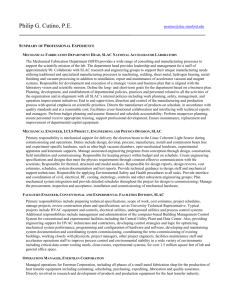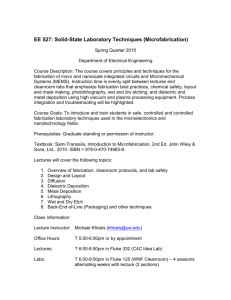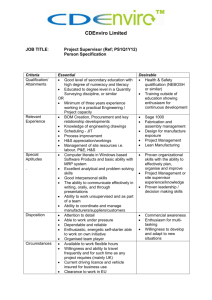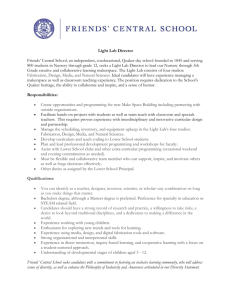Lecture Presentation
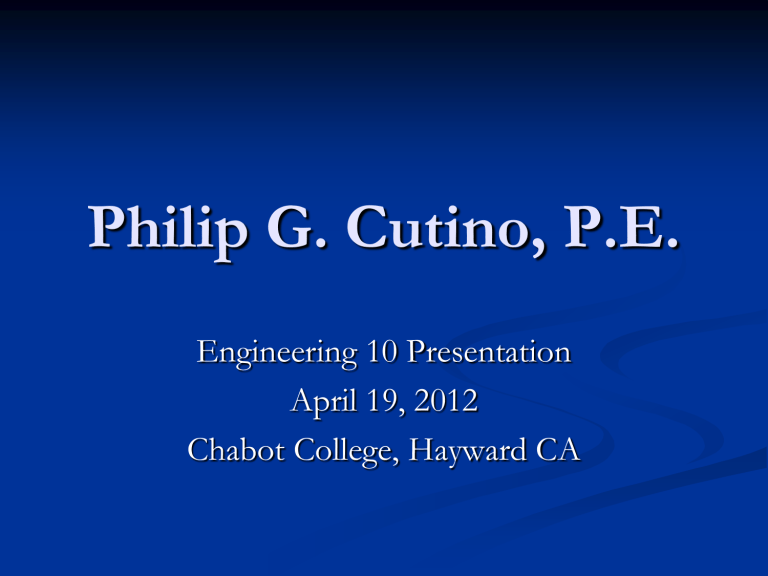
Philip G. Cutino, P.E.
Engineering 10 Presentation
April 19, 2012
Chabot College, Hayward CA
Today’s Agenda
SLAC National Accelerator Laboratory
Linac Coherent Light Source (LCLS)
My role at SLAC over the years
The Mechanical Fabrication Department
Mr. Phil Cutino • ENGR10 • Sp12
Stanford Linear Accelerator Center
Location: Menlo Park, CA
Type: Multi-program Laboratory
Contract Operator: Stanford University
Website: www.slac.stanford.edu
Physical Assets:
426 Acres
145 Buildings
1.8M GSF in Active Operational Buildings
Human Capital
Employees: 1,496 FTE as of 4/15/08
Users, Visiting Scientists and Grad Students: 3036 Head
Count
Mr. Phil Cutino • ENGR10 • Sp12
SLAC Mission
SLAC programs explore the ultimate structure and dynamics of matter and the properties of energy, space and time - at the smallest and largest scales, in the fastest processes and at the highest energies through robust scientific programs, excellent accelerator based user facilities and valuable partnerships .
Mr. Phil Cutino • ENGR10 • Sp12
Research at SLAC
Accelerator Physics
Astrophysics and Cosmology
Elementary Particle Physics
Materials and Nanoscience
Molecular Environmental Science
Structural Biology
Ultrafast Science http://www6.slac.stanford.edu/Research.aspx
Mr. Phil Cutino • ENGR10 • Sp12
LCLS
Linac 1003 meters
708 devices
Total Machine* : ~1750 meters of beam line 1242 Devices
Injector: 28 meters of beam line & 95 devices
LTU & Dump
408 meters
176 Devices
*Electron Beam Line Only
Does not include Photon Beam Lines
Mr. Phil Cutino • ENGR10 • Sp12
Linac Coherent Light Source
Ultrafast X-ray science
Directly observe the motions of atoms on ultrafast time scales
Investigate dynamics, bonding, heating and melting, at atomic and nanometer length scales
Create and observe extreme new conditions in atoms and materials
Imaging of nonperiodic molecules and nanostructured materials
World’s first X-ray free electron laser
Producing 100 femtosecond pulses of photons in the energy range 800-
8,000 eV
10^ 12 coherent X-ray photons/pulse
Potential for sub-femtosecond pulses
Lead nanoscale science revolution
Master control of energy-relevant complex systems
Lead the world in the investigation of dynamics of atomic transitions, chemical bonding, catalysis and heating
Mr. Phil Cutino • ENGR10 • Sp12
Links to More Information
http://www.slac.stanford.edu
http://lcls.slac.stanford.edu
http://www6.slac.stanford.edu/ExploringSLACScie nce.aspx
https://news.slac.stanford.edu/
Mr. Phil Cutino • ENGR10 • Sp12
Atypical career path
Mechanical Engineer
Register Professional Engineer in CA
Returned to school late in life
Diverse background . . .
~25 years with the same employer
Four different jobs
Mr. Phil Cutino • ENGR10 • Sp12
My Roles at SLAC
Process Control Instrumentation
Technician
Facilities Engineer
Accelerator Engineer
Mechanical Fabrication Department Head
Mr. Phil Cutino • ENGR10 • Sp12
Mechanical Fabrication
Department
Phil Cutino
October 27, 2010
Mission and Vision
• Mission
– Provide specialized manufacturing and field support services necessary for the Lab to achieve it’s stated goals
– Provide collaborative and quick turn around manufacturing
– Provide services unique to the SLAC mission not available elsewhere
• Vision
– Partner with SLAC organizations to effectively deliver high quality manufacturing services in a safe and cost efficient manner supporting the scientific mission
Mechanical Fabrication Department
Page 12
Delivering SLAC’s Mission
• Broad capability on site for specialized manufacturing services
– High quality, consistency, capacity and unique accelerator research specific processes developed and delivered safely
• Technical know how developed over many years
– Highly trained & experienced staff available for changing needs of an experimental research user facility
• Quick turn around and collaborative manufacturing
– Metal Finishing
• Documented processes developed specifically for accelerator research needs
– Hydrogen Furnace Brazing
– Vacuum Processing and Precision Assembly
– Magnet fabrication, refurbishment and repair
– Machining
• Special capability such as ability to machine exotic & low-level radioactive materials
• Field work includes installation, installation coordination, accelerator mechanical and vacuum system maintenance and operations
Mechanical Fabrication Department
Page 13
Organization
• 85 Full time staff members
– 6 Engineers
– 12 Science & Engineering Associates
– 67 technicians and trades
• 9 supervisors
• 12 matrixed out
– Formal matrix agreements
• 9 are temporary employees
• Very experienced workforce
– 16% have 10 to 20 years of service
– 19% have 20 to 30 years of service
– 9% have more than 30 years of service
Mechanical Fabrication Department
Page 14
Organization continued
• Management (4)
– Mgmt., Admin., ES&H support
• Production Planning (6)
– Job inputs, Estimating
– Manufacturability Review
• Machine Maintenance (4)
• Field Operations (6)
• Vacuum Shop (21)
– Vacuum Processing
– Precision Assembly
• Braze Shop (7)
– Precision Assembly
• Machine Shop (12)
• Metal Finishing (8)
• Structural Fabrication Shop (7)
– Magnet Coil Shop
– Sheet Metal and Welding Shops
Mechanical Fabrication Department
Page 15
Core Competencies
• Broad range of technical know-how necessary to support the scientific mission
– Generally very high quality on site for ongoing and urgent operational needs as well as collaborative manufacturing
• Manufacturing & Field Support Services
– Seamless integration of production planning, machining, metal finishing, magnet fabrication, precision assembly, sheet metal forming, welding operations, quality assurance, vacuum processing with installation, maintenance and repair
Mechanical Fabrication Department
Page 16
Core Competencies continued
Machine Shop
Clean Machining for UHV
Quick Turnaround
Radioactive Materials
DFM & Prototype Parts
Mechanical Fabrication Department
Page 17
Core Competencies continued
Hydrogen Furnace Brazing
And
Heat Treating
Mechanical Fabrication Department
Page 18
Core Competencies continued
Metal Finishing
Plating and
Cleaning for UHV
Mechanical Fabrication Department
Page 19
Core Competencies continued
Mechanical and Vacuum
Processing and
Field Operations
Precision Assembly
Mechanical Fabrication Department
Page 20
Performing Work
• Customers have access to the manufacturing process
– Scope and technical changes are routinely accommodated
– Collaborative manufacturing is facilitated
– Problems are solved quickly
• Customer feedback is regularly provided
– Cost and schedule estimates are provided as part of the job input process
– Customers can check an online tool for real time updates
– Scope and technical changes are not re-estimated unless requested by the customer
• Regular planning meetings are held
– There is a standing weekly meeting for all field work
– Larger projects are coordinated in project specific meetings held weekly or as needed
Mechanical Fabrication Department
Page 21
Performing Work continued
• Quality assurance is integrated and documented on travelers.
– All machined parts are independently quality checked by MET unless the customer requests this step is to be skipped
– Vacuum processing reports are recorded in traveler
– Vacuum leak checking is provided in the shop on assemblies and in the field on systems
• Manufacturing process is seamlessly integrated
– Procurement of materials, machining, metal finishing, vacuum processing, precision assembly and installation can be procured from a single request
– In process storage of components and assemblies is provided
• Schedule updates are available to project managers
– Schedule reporting is provided to customers or to integrated schedules as requested by customers
• Change control is generally formal
Mechanical Fabrication Department
Page 22
Performing Work continued
Collaborative Manufacturing Example:
Wire Card for combination OTR / Wire Scanner
Developed for KEK by Doug McCormick (SLAC)
Resolution ~2 microns
Technical Challenge:
10 micron Tungsten Wire
Soldered to gold plated Macor substrate requiring high positional accuracy
Mechanical Fabrication Department
Page 23
Concluding Work
• Estimate vs. Actual reports are provided for all jobs.
– Actual costs are available online for future use in estimating.
– Historical and real time data is searchable by part number, customer name and job number.
– Performance reporting is facilitated using manufacturing software.
– Performance reports are published monthly.
• Scope changes are not typically re-estimated.
– Scope changes affect performance.
– Recently began tracking jobs with significant changes.
• All Redline drawings are routed back to MED for updating.
• An online feedback tool is available.
Mechanical Fabrication Department
Page 24
Questions and Answers
Mechanical Fabrication Department
Page 25
